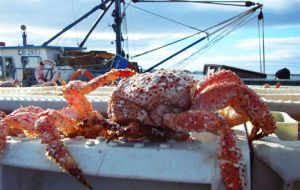MercoPress. South Atlantic News Agency
Spider crab season kicks off in Punta Arenas; target 2.300 tons
 The season was slow in beginning because of the terrible weather
The season was slow in beginning because of the terrible weather The first boatloads of Magellan spider crabs (king crab) arrived in Punta Arenas, extreme south of Chile, late last week, marking the commencement of the 2009 spider crab season and the end of the National Fishing Service’s six month ban on hunting the prized crustaceans.
The first 400 boats have brought in more than 8.000 kilos of crab to the Barranco Amarillo fishing dock, seven kilometres north of Punta Arenas.
Each year the export of Magellan spider crabs to the United States, Europe, and Asia brings in 10 to 20 million US dollars in sales.
This year, local fishermen are hoping to catch as much crab as they did in 2008, when 2.300 tons were harvested. One of the vessels, “Don Gaby,” brought in 2.000 kilos of crab to the fishing dock, while “Navegante VI” brought in almost 6.000 kilos. Both had been travelling for around 18 hours at sea, from the canals close to the Magellan Strait, where they set the traps, to Punta Arenas.
Each boat takes uses 200 to 500 metal traps which they leave submerged in the ocean at depths of 60 to 200 meters.
The Chilean National Fishing Service authorizes spider crab fishing between July and November, a period in which around 400 vessels enter the Magellan waters to begin the hunt.
According to Juan Lemus, President of the Punta Arenas Fishing and Artisan Boating Trade Union, spider crab season got off to a slow start this year.
Although the season officially began on July 1, it was postponed due to bad weather conditions in the fishing zones.
“The weather has been terrible and few crabs are coming out” said Lemus.
“The fishing carriers and launches are just beginning to arrive, but the bad weather has affected them on the fishing days.”
Lemus anticipates that despite the late start date, and despite the fact that crab production has decreased in recent years, last year’s total of 2,300 tons can still be reached.
Region XII (Magallanes region) is a principal exporter of crustaceans, among which the Magellan spider crab is a particular speciality. Each year the extraction of the crabs provides around 1.600 local jobs.
The National Fishing Service has tightened its management of the crab industry to avoid illegal captures in the zone, where female crabs or crabs smaller than the legal size are often extracted.
By Natalie Muller - Santiago Times




Top Comments
Disclaimer & comment rulesCommenting for this story is now closed.
If you have a Facebook account, become a fan and comment on our Facebook Page!